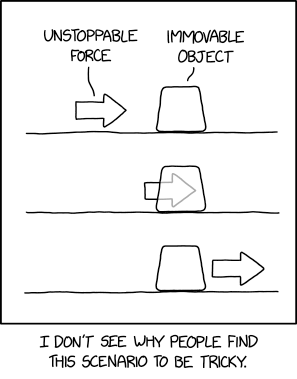this post was submitted on 02 May 2025
823 points (98.4% liked)
xkcd
15305 readers
128 users here now
A community for a webcomic of romance, sarcasm, math, and language.
founded 2 years ago
MODERATORS
you are viewing a single comment's thread
view the rest of the comments
view the rest of the comments

Are you sure? I mean the word "heavy" was what I was going on, but there is a distinction I suppose.
Yeah, that's true... But again, I do have to stress that there is no alternative to "finitely massive" you really can't have an object of infinite mass in our universe.
Edit: So I guess it comes down to this: If "lift" and "move" are synonymous, then anyone can move any object of finite mass. An object of infinite mass can't exist in this universe. So you could say that the answer to the question is definitively no, God can't create a rock so big that he couldn't lift it, at least not given the laws of physics in this universe as he created it. (For this conjecture we're assuming God exists and created the universe).
If God created this universe he could in theory also create other universes with different laws of physics. So in that case, sure, why not, who knows.